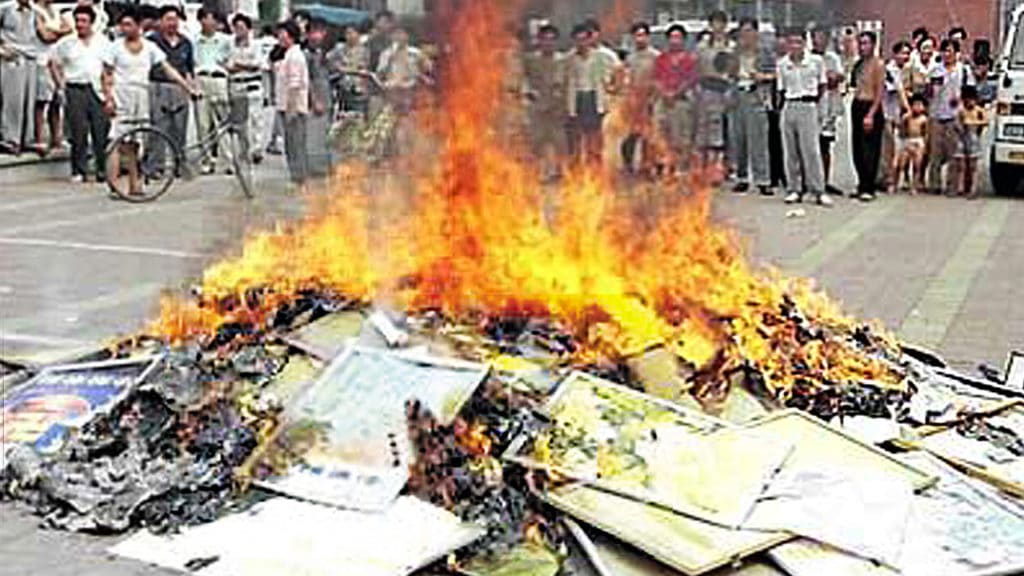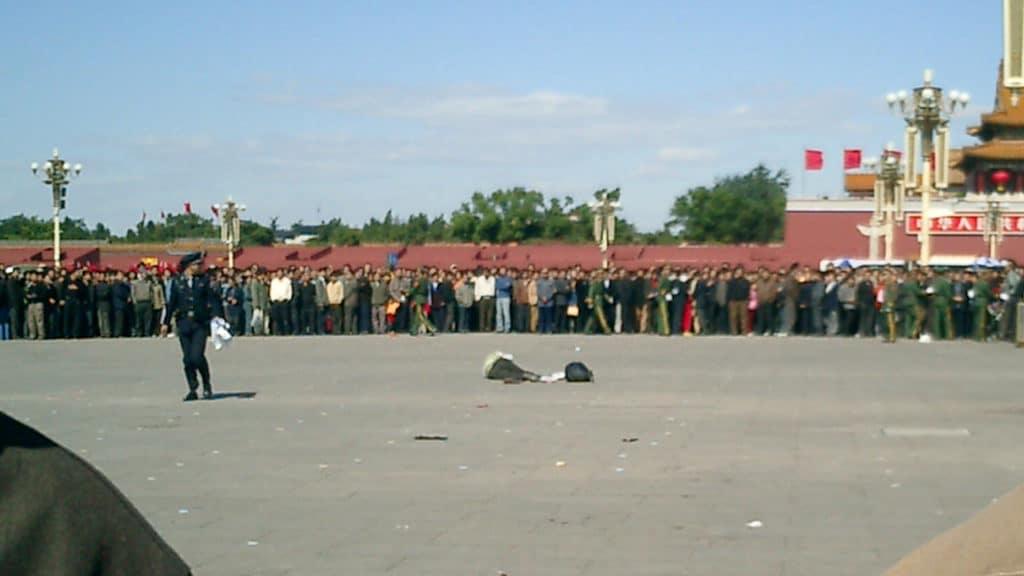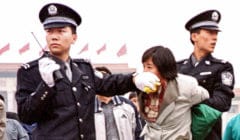
Terror Unleashed
It began in the middle of the night, July 20, 1999.
Across China under the veil of darkness, police dragged ordinary people from their beds. Many would be taken to holding centers and jails, others beaten, and some would die from torture.
Police were acting on directives from Communist Party head Jiang Zemin, who ordered the group crushed. By most accounts, Jiang was resentful of the popular practice—its believers numbered 100 million—and wished to make a show of power.
Two days later, on July 22, Falun Gong was banned across the land, marking the official beginning of a violent campaign in China that has raged for more than two decades and cast tens of millions of apolitical citizens as enemies of the state.
“Eradicate them in three months!”
Early arrests of thousands of Falun Gong practitioners revealed that some were officials in the central government, the police, and even the military. The practice attracted people from all walks of life, from factory workers to university professors to family members of cadres in the Politburo.
Jiang Zemin, as the head of an atheist, communist, totalitarian state, harbored a lot of fear. The popularity, rapid growth, and sheer size of Falun Gong was a huge threat. But so was the teaching’s potency in the restoration of spiritual life and traditional Chinese culture in society — something the communist party had been trying to eradicate for decades.

“Defame their reputations. Bankrupt them financially. And destroy them physically!”
After a stand off with the party’s Politburo, the majority of which were opposed to a crackdown on Falun Gong, Jiang labelled the practice a threat to the Party and said it would be an international loss of face if Falun Gong were not immediately crushed. Jealous of Falun Gong’s popularity, he ordered the practice to be eradicated within three months, using any means necessary.
The Gestapo-like “610 Office”
The 610 Office is the extra-legal police task force responsible for carrying out the mission of eliminating Falun Gong.
There is no legislation establishing the 610 Office—named after its June 10, 1999 date of creation—nor are there laws delineating its powers. Instead, it was established by Jiang and announced in his speech to elite cadres over a month before Falun Gong was officially banned. Jiang’s orders for the new bureau? “Immediately organize forces,” “form battle strategies,” and “get fully prepared for the work of disintegrating [Falun Gong].”
Copies of Jiang’s speech about the 610 Office were immediately circulated to every level of China’s bureaucracy, telling cadres that they “must cooperate” closely with the 610 and its affiliates. Aided by the fact that all Chinese judges were Communist Party members, Jiang essentially placed the agency above the law.
The 610 Office had virtually unlimited powers. China’s vast security apparatus, including the police force and intelligence officers, was to serve at the beck and call of the 610 Office. From large corporate offices to the smallest of neighborhood organizations, 610 staff were empowered to dictate orders in any effort aimed at detaining Falun Gong practitioners.
Furthermore, Jiang gave orders to the 610 Office to use “every means necessary,” a mandate that led to what the 610 Office soon become most notorious for—the use of extreme torture.
Police Raids, Ransacking Homes, Kidnapping and Imprisonment
Beginning in July 1999, when the CCP officially launched the campaign against Falun Gong, the dark days of the Cultural Revolution returned.
Police raided homes, confiscated valuables, destroyed Falun Gong materials, and hauled people away to detention centers or forced labor camps.
Trucks drove down the streets with mounted loud-speakers, through which denunciations of Falun Gong pierced the air.

A Hong Kong newspaper reported that 50,000 individuals were detained in the first week of the crackdown. In fact, during the first few weeks, Falun Gong practitioners were rounded up and held in stadiums because the sheer number of detainees could not fit in China’s vast array of detention centers and prisons.
Nationwide Burnings of Falun Gong Books Bring Back Memories of the Cultural Revolution
Under the order from the CCP leadership, local authorities across the country made an all-out effort to eliminate Falun Gong books and other promotional materials. Chinese authorities searched bookstores, vendors, multimedia stores, copy-centers and print shops, and punished anyone for possessing or distributing any Falun Gong associated items.
In just three months, Chinese authorities confiscated, burned, and destroyed tens of millions of Falun Gong books, videotapes, audio-cassettes, and other related materials across the country.

Destroying Falun Gong publications sent a signal to the Chinese public regarding the regime’s seriousness about the campaign. However, this type of public display backfired in the eyes of many who shuddered at the idea of reliving the horrors of the Cultural Revolution.
The mass destruction of Falun Gong books also made clear that the regime sought to destroy any evidence that could readily disprove the fabrications and distortions about Falun Gong’s beliefs that would come to dominate anti-Falun Gong propaganda in the state-run media. Tragically, this was effective. As the public lost access to Falun Gong books, the central propaganda agencies and media filled the void by twisting Falun Gong teachings to justify the campaign against the group.
Secret Press Conference with Western Media Proves Deadly
October 1999 • The persecution campaign against Falun Gong was in its third month.
With no channel for speaking out and an increasingly brutal environment engulfing them, several Chinese people who practiced Falun Gong secretly arranged a press conference in Beijing with Western media. Reporters from Reuters, The Associated Press, and the New York Times were invited.
During the press conference, Falun Gong practitioners revealed to media what they were suffering in the persecution, and explained that they simply wanted an environment to freely practice their faith.
Photos of the press conference made the front page of the New York Times the following day.
Two of the Falun Gong practitioners who attended the conference were later tortured to death in Chinese custody.

Chinese authorities began to harass foreign journalists who had been covering the unfolding crackdown on Falun Gong.
The five foreign reporters who attended the secret news conference had their credentials temporarily taken away by Chinese public security authorities. The following week, the Chinese Foreign Ministry called in these journalists to issue warnings. One of the foreign reporters was issued a very severe admonition that was described as “just short of an expulsion.”


“Our members have been followed, detained, interrogated and threatened. Television reporters have had satellite transmissions interfered with and video shipments delayed. A number of members have had their press cards and residence permits indiscriminately confiscated, and some have been threatened with further, more serious action.”
Show Trial: 18 Years in Prison for Practicing Falun Gong
December 26, 1999 • Clearly timed so that Western media would be unlikely to pick it up, the day after Christmas, the Chinese government put on a show-trial, sentencing four prominent Falun Gong practitioners to seven to eighteen years in prison.

Zhiwen Wang (at microphone on the left) stood trial with three other Falun Dafa practitioners. This show trial was meant to influence other practitioners, helping convince them to give up the spiritual discipline (via Wang family).
Chinese officials prevented foreign media from reporting on the show trial, and no further details were released because Western media coverage was not the goal. The trial was televised throughout China (where Christmas is not a major holiday), sending a strong message to discourage the public from continuing to practice Falun Gong.
Human Rights Watch condemned the harsh sentences. “These Falun Gong members should never have been arrested, much less given heavy sentences.”
Torture and Deaths in Custody
October 25, 1999 • The death of 17-year-old Chen Ying was the first confirmed report of a Falun Gong practitioner dying in police custody.
In the coming months, more reports followed, many including details of torture and severe abuse in custody.
Due to the difficulty and risk involved in collecting details of deaths in custody and transmitting those details to human rights workers outside China, it was often weeks or months after the fact when a case was made public.
By the middle of 2000, the pattern was evident: Falun Gong practitioners were being routinely tortured in detention facilities across China, and in many cases, people were dying from the torture. Furthermore, the freedom to “use any means necessary” to force Falun Gong practitioners to give up their faith was resulting in widespread atrocities.
Wall Street Journal: A Deadly Exercise
April 20, 2000
“The day before Chen Zixiu died, her captors again demanded that she renounce her faith in Falun Dafa. Barely conscious after repeated jolts from a cattle prod, the 58-year-old stubbornly shook her head.
Enraged, the local officials ordered Ms. Chen to run barefoot in the snow. Two days of torture had left her legs bruised and her short black hair matted with pus and blood, said cellmates and other prisoners who witnessed the incident. She crawled outside, vomited and collapsed. She never regained consciousness, and died on Feb. 21.”
Throughout 2000, the Wall Street Journal‘s Ian Johnson published a ground-breaking series of articles that detailed the brutal ramping up of the Chinese regime’s violence toward Falun Gong practitioners and how the directives for the campaign came directly from Beijing.
Mr. Johnson won the Pulitzer Prize in 2001 for this Falun Gong series to report that officials in China had received explicit orders to torture and maim Falun Gong practitioners who did not abandon their beliefs.
A year after Johnson’s articles, the Washington Post published an article detailing how local officials had received explicit orders to torture and maim Falun Gong practitioners who did not abandon their beliefs.
The Washington Post: Torture is Breaking Falun Gong
August 2001
“After a year and a half of difficulties in suppressing the movement, the government for the first time this year sanctioned the systematic use of violence against the group, established a network of brainwashing classes and embarked on a painstaking effort to weed out followers neighborhood by neighborhood and workplace by workplace.”
Practitioner’s Last Resort: Tiananmen Square
January 2000 • For months, the state-run media had been saturated with fabricated reports vilifying Falun Gong.
Falun Gong practitioners were being expelled from university and fired from their jobs. Their homes were ransacked at will by the police, and anyone who practiced faced the real threat of being hauled away by police at any moment.
Many would be sent to forced labor camps with no trial.
All official channels for appealing to the government were closed.
And so, with nowhere else to turn, Falun Gong practitioners began making public appeals in Tiananmen Square.
At first, the demonstrations were small and only occasional, but soon people were flocking to Beijing from every corner of China to step onto the square, hold up a banner with Falun Gong’s core tenets — Truthfulness, Compassion, and Forbearance — and proclaim their innocence.

“Falun Gong members make unlikely protesters,” noted Reuters in its report on Chinese practitioners making an appeal to the authorities. “On October 29, dozens of members escalated their civil disobedience by sitting in the lotus position in the square and staying stoically silent as police kicked, punched, and dragged them to minivans by the hair.”
“We don’t hate the people who beat us. We understand they have been told too many lies. They don’t know the truth about us,” one practitioner explained.
Despite the public security police, armed police and plainclothes police present everywhere on the Square, practitioners kept coming and tirelessly exposing the CCP’s lies to the public.
On February 4, 2000, Chinese Lunar New Year’s Eve, a group of Falun Gong practitioners had barely started to practice their meditation in Tiananmen Square when “police pounced on the protesters immediately, running toward them from all corners of the square. They kicked, punched and dragged them to their feet, herded them into vans and drove them away,” reported AFP on February 5, 2000. “Chinese police have detained hundreds, and possibly thousands of practitioners,” the report said.

The Crippling Cost of Tyranny
In 2001, a report from the Party’s Public Security Department revealed that, at just Tiananmen Square, the expense of arresting Falun Gong practitioners cost up to 2.5 million yuan per day, which amounts to almost 910 million yuan per year.
In the whole country, from cities to remote rural areas, from the police in police stations and public security departments to the personnel at all branches of the “610 Office,” Jiang Zemin employed at least a few million people to persecute Falun Gong.
The cost in wages alone likely exceeded one hundred billion yuan per year.


“The financial resources used to deal with Falun Gong have exceeded the outlay for a war.”
Moreover, Jiang spent huge amounts to expand forced labor camps and build brainwashing centers and surveillance systems. He also used monetary incentives to encourage greater numbers of people to participate in persecuting Falun Gong. In many areas, the prize for arresting a Falun Gong practitioner was several thousand or even ten thousand yuan.
The Propaganda is Failing, the Public’s Opinion on Falun Gong Has Not Changed
After nearly 18 months of the CCP’s raging campaign, the Chinese public continued to express disdain for Jiang’s suppression of Falun Gong practitioners. The campaign to turn public opinion against Falun Gong appeared to be destined for failure.
The CCP leadership’s frustration with their failure to quickly and thoroughly dismantle Falun Gong was evident in its media coverage. By 2001, contrary to earlier statements by the Chinese government, the war on Falun Gong had not yet been won, and the “broad masses” had to be made to understand the “ferocity of [their] battle with Falun Gong.”
As such, Jiang and his cronies hatched a plan…
The “Self-Immolation” Hoax Turns the Tide
January 23, 2001 • It’s Chinese New Year’s Eve, the eve of the new millennium. Five individuals allegedly set themselves on fire in Tiananmen Square. Within hours, Chinese authorities flooded the state-run media with grisly photos of the event, claiming the self-immolators were Falun Gong practitioners.
Days later, a Washington Post article revealed that at least two of the self-immolators had never been seen practicing Falun Gong. Further evidence uncovered in the subsequent weeks revealed the incident was staged.


“The regime points to a supposed self-immolation incident in Tiananmen Square on January 23, 2001 as proof to slander Falun Gong. However, we have obtained a video of that incident that in our view proves that this event was staged by the government.”
Inside China, however, where state-run media was saturated with programs accusing the Falun Gong teachings of causing the tragedy, the incident became a key tool for Chinese authorities to bend public opinion against Falun Gong.

Within a month, authorities issued and started to spread glossy pamphlets which featured color photographs of the charred bodies. A new wave of propaganda efforts saturated the news, television programs, schools, and work places. Reminders of the event were available everywhere, around the clock.
Some eight million students across the nation joined the propaganda and educational activities using window displays, posters, leaflets, and video displays to denounce Falun Gong. Anti-Falun Gong classes were scheduled in schools; and 12 million youngsters nationwide reportedly denounced Falun Gong in writing.

School children are not spared • Elementary school textbook from mainland China, Thoughts and Moral Education, by People’s Education House, has used the staged Tiananmen “self-immolation” incident to incite children to hate Falun Gong.
The endless propaganda coverage of this “self-immolation” incident turned the general public from Falun Gong sympathizers into people who accepted the repression with indifference. Cases of hate crimes against Falun Gong practitioners increased significantly and Jiang’s regime seized the opportunity to intensify the persecution.
According to incomplete statistics, during the first eighteen months of the persecution, 173 practitioners were persecuted to death. After the “self-immolation” incident, the death toll increased sharply to 869 in the following thirty-six months.




